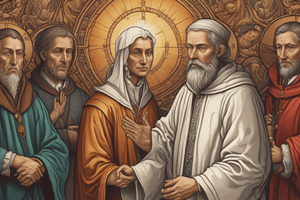Podcast
Questions and Answers
Luther's ideology provided a basis for Germans to resist Hitler during the Second World War.
Luther's ideology provided a basis for Germans to resist Hitler during the Second World War.
False (B)
Historians should only focus on the differences between the present and the past when interpreting historical events.
Historians should only focus on the differences between the present and the past when interpreting historical events.
False (B)
The author believes that Luther's views on the civil magistrate are overly simplistic.
The author believes that Luther's views on the civil magistrate are overly simplistic.
True (A)
The concept of anachronism is essential in historical interpretation to avoid reading modern categories into the past.
The concept of anachronism is essential in historical interpretation to avoid reading modern categories into the past.
Luther's ideology was widely accepted by all Germans during the Second World War.
Luther's ideology was widely accepted by all Germans during the Second World War.
Historical interpretation is a straightforward process that requires no nuanced consideration of the past and present.
Historical interpretation is a straightforward process that requires no nuanced consideration of the past and present.
Luther's power was consolidated after the crisis of 1522.
Luther's power was consolidated after the crisis of 1522.
The author suggests that historians should not consider the present day when interpreting historical events.
The author suggests that historians should not consider the present day when interpreting historical events.
Luther's views on the Jews are not relevant to understanding his ideology.
Luther's views on the Jews are not relevant to understanding his ideology.
Zwilling and Karlstadt remained in Wittenberg after the crisis of 1522.
Zwilling and Karlstadt remained in Wittenberg after the crisis of 1522.
Luther traveled extensively outside of electro-Saxony for the rest of his career.
Luther traveled extensively outside of electro-Saxony for the rest of his career.
Luther wrote 'On Secular Authority' in 1522.
Luther wrote 'On Secular Authority' in 1522.
The Lutheran Church had a stellar record during the Third Reich.
The Lutheran Church had a stellar record during the Third Reich.
The relationship between the church and secular authorities is not a pressing issue in the history of Lutheranism.
The relationship between the church and secular authorities is not a pressing issue in the history of Lutheranism.
Luther's views on secular authority are only relevant to his own time.
Luther's views on secular authority are only relevant to his own time.
The crisis of 1522 marked the beginning of Luther's rise to prominence.
The crisis of 1522 marked the beginning of Luther's rise to prominence.
According to Luther's 1523 writings, lying is permissible in the name of love.
According to Luther's 1523 writings, lying is permissible in the name of love.
In 1st Samuel 20, Jonathan lies to Saul about David's absence from the feast and is criticized for it.
In 1st Samuel 20, Jonathan lies to Saul about David's absence from the feast and is criticized for it.
Luther's views on Jews and Judaism were a significant factor in the German resistance to Nazism.
Luther's views on Jews and Judaism were a significant factor in the German resistance to Nazism.
Rahab the prostitute is condemned in the Bible for lying about the spies.
Rahab the prostitute is condemned in the Bible for lying about the spies.
Historical anachronism is a common problem when interpreting the views of 16th-century figures like Luther.
Historical anachronism is a common problem when interpreting the views of 16th-century figures like Luther.
Luther's ideology provided a framework for active resistance against authority in 16th-century Europe.
Luther's ideology provided a framework for active resistance against authority in 16th-century Europe.
The speaker argues that the normal rules of morality do not apply when dealing with the Lord's anointed.
The speaker argues that the normal rules of morality do not apply when dealing with the Lord's anointed.
The Bible always condemns lying in all circumstances.
The Bible always condemns lying in all circumstances.
In Luther's time, there was widespread debate about whether murder was morally acceptable.
In Luther's time, there was widespread debate about whether murder was morally acceptable.
Luther's world was predominantly Jewish.
Luther's world was predominantly Jewish.
Historical interpretation requires considering the differences between the past and the present.
Historical interpretation requires considering the differences between the past and the present.
In the 16th century, people had a wide range of choices for where to attend church.
In the 16th century, people had a wide range of choices for where to attend church.
The concept of anachronism is irrelevant to historical interpretation.
The concept of anachronism is irrelevant to historical interpretation.
There was significant debate in the 16th century about the morality of adultery.
There was significant debate in the 16th century about the morality of adultery.
The rise of modernity has been characterized by increased intellectual choice.
The rise of modernity has been characterized by increased intellectual choice.
The 16th century was characterized by a secular worldview.
The 16th century was characterized by a secular worldview.
According to the author, Luther's theology of 1523 denies all forms of resistance.
According to the author, Luther's theology of 1523 denies all forms of resistance.
The author believes that Luther's views on secular authority are relevant to understanding the Nazi regime in 1930s Germany.
The author believes that Luther's views on secular authority are relevant to understanding the Nazi regime in 1930s Germany.
Luther's ideology was based on the idea of active resistance to unjust authority.
Luther's ideology was based on the idea of active resistance to unjust authority.
The author argues that historians should focus solely on the historical context of Luther's ideas and ignore their relevance to modern times.
The author argues that historians should focus solely on the historical context of Luther's ideas and ignore their relevance to modern times.
The author believes that Luther's views on secular authority are overly simplistic and do not provide a nuanced understanding of the relationship between the state and the individual.
The author believes that Luther's views on secular authority are overly simplistic and do not provide a nuanced understanding of the relationship between the state and the individual.
The author suggests that Luther's views on Jews and Judaism are not relevant to understanding his ideology.
The author suggests that Luther's views on Jews and Judaism are not relevant to understanding his ideology.
The concept of anachronism is not relevant to understanding Luther's views on secular authority.
The concept of anachronism is not relevant to understanding Luther's views on secular authority.
Luther's views on secular authority were widely accepted by all Christians in 16th century Europe.
Luther's views on secular authority were widely accepted by all Christians in 16th century Europe.
Flashcards are hidden until you start studying
Study Notes
Luther's Legacy and the Third Reich
- One popular interpretation of Luther is that he provides an ideological basis for Germans to offer no resistance to Hitler during World War II.
- However, this interpretation is too simplistic and ignores the complexities of Luther's thought.
Historical Context and Distance
- Historians need to balance finding analogies with the past to make it comprehensible while avoiding anachronism and recognizing the differences between the present and past.
- The art of history involves being aware of these temptations and trying to resist them.
Luther's Life and Writings
- After the crisis of 1522, Luther's power was consolidated, and he became the undisputed leader of the Wittenberg Reformation.
- Luther's position was secure, and he did not travel much outside of Electoral Saxony for the rest of his career.
- In 1523, Luther wrote "On Secular Authority, To What Extent It Should Be Obeyed," a significant text in its own time and in the history of Lutheranism.
Luther and Resistance to Authority
- Luther's writings in 1523 do not provide an ideological basis for blind obedience to authority, but rather a framework for limited resistance.
- Luther's views on resistance evolved over time, and by 1530-1531, he provided more basis for active resistance.
- Luther's theology permits passive resistance, such as accepting the consequences of not being complicit in wickedness, but not active defiance.
Lying and Deception
- The biblical text, particularly in the Old Testament, presents examples of lying in extreme circumstances, such as Jonathan's lie to Saul about David's absence.
- The text does not indicate that these lies were inappropriate or wrong.
- Luther's world was a default Christian world, where certain moral norms were assumed, and the concept of intellectual choice was limited.
Theological Context
- Luther's theology is characterized by the idea of suffering and being exalted through that suffering, as exemplified by Christ.
- This theology can be applied to situations like Nazi Germany, where refusing to obey an unjust authority would result in death, but the legitimacy of the authority is still recognized.
- Luther's theology is not a simple denial of all resistance, but rather a nuanced approach that rejects active resistance while permitting passive resistance.
Studying That Suits You
Use AI to generate personalized quizzes and flashcards to suit your learning preferences.




